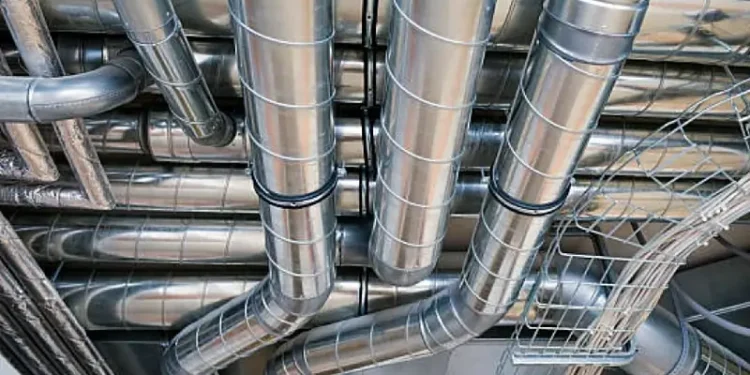The Competition and Markets Authority (CMA) has stepped in, ordering Lindab, a Swedish ventilation firm, to sell two sites in Nottingham and Stoke-on-Trent. Following its merger with HAS-Vent, the CMA’s investigation revealed that this deal reduced competition, posing risks of higher prices and fewer choices for local installers.
The CMA’s Findings and Actions
After a rigorous Phase 2 inquiry, the CMA determined that Lindab’s acquisition of HAS-Vent, another UK-based ventilation systems supplier, would significantly reduce competition in these regions.
According to Kirstin Baker, Chair of the independent inquiry group,
“Our investigation found this deal—by removing one of two main suppliers of these products in the Nottingham and Stoke areas—risked installers and developers having to pay more for these products.”
This statement underscores the CMA’s position and the importance of maintaining competitive prices for construction components across the UK.
To resolve the situation, the CMA has instructed Lindab to divest one site in each of the affected areas. However, to ensure flexibility for potential buyers and to meet diverse operational needs, the authority has mandated that Lindab put all four of its sites in these regions up for sale.
The aim is to attract a broader pool of buyers, maintaining healthy competition in the ventilation products market.
Impact on Nottingham and Stoke-on-Trent
The CMA’s decision is crucial for Nottingham and Stoke-on-Trent, two areas where Lindab and HAS-Vent are dominant players in the ventilation industry. The inquiry highlighted that local markets for ventilation ducts and fittings are sensitive to changes in competition.
By merging with one of its main competitors, Lindab had the potential to control prices and limit options for local installers and developers.
To prevent this, Lindab is now required to present suitable buyers to the CMA for approval. This measure ensures that any future purchaser will continue to offer competitive products, maintaining the economic balance in these regions.
Such intervention is vital for keeping costs down for contractors working on projects such as new office buildings and housing developments.
Lindab’s UK Operations and the Divestment Process
Lindab, headquartered in Sweden and listed on Nasdaq Stockholm, operates in the UK through its subsidiaries, Lindab Limited (Lindab UK) and Ductmann Limited (Ductmann).
Both companies manufacture and distribute ventilation products, including circular ducts and fittings that are essential in construction. The acquisition of HAS-Vent, based in Wombourne, added significant market share for Lindab in England and Wales.
With the CMA’s decision, Lindab must market the following sites for sale:
Site Location |
Current Owner |
|---|---|
| Nottingham | Lindab |
| Stoke-on-Trent | Lindab |
| Nottingham | HAS-Vent |
| Stoke-on-Trent | HAS-Vent |
This table illustrates the locations and ownership of the sites to be marketed.
The CMA’s approach allows a mix of manufacturing and non-manufacturing assets to appeal to different buyers. By casting a wider net, Lindab is encouraged to facilitate a competitive bidding process, helping maintain a level playing field for the UK ventilation market.
Ensuring Market Balance and Fair Pricing
The CMA’s decision is more than just a response to a merger; it’s a measure to protect the interests of the broader public and the local business communities. With escalating construction and development projects in the UK, access to affordable and efficient ventilation solutions is crucial.
By mandating the divestment, the CMA aims to ensure that local installers in Nottingham and Stoke-on-Trent do not suffer from inflated prices or limited product availability due to reduced competition.
To add to this, the CMA will keep a close eye on the divestment process to guarantee compliance with its ruling. Although the investigation has concluded, the CMA has emphasised that it will “monitor the parties’ progress in implementing the remedy.”
This ongoing supervision ensures that Lindab follows through with the sale and that any buyers meet the authority’s criteria for maintaining competitive practices.
Broader Implications for the UK Ventilation Market
Lindab’s situation serves as a reminder of the importance of regulatory bodies in maintaining fair business practices. While mergers can often lead to efficiencies and innovation, they can also risk monopolistic behaviours that harm consumers and smaller businesses.
By intervening, the CMA sends a clear message to other players in the industry: competition laws are in place to safeguard market diversity and fairness, particularly in specialised industries like ventilation systems.
For those following developments in the UK’s building and construction sectors, the outcome of this case will be pivotal. It demonstrates the CMA’s commitment to its mission of protecting competition while ensuring that businesses operate on an equal footing.
It also underscores the need for vigilance in monitoring acquisitions that could tip the balance of the market.
Final Thoughts
Lindab’s divestment is a crucial move to restore competition in Nottingham and Stoke-on-Trent. The CMA’s actions protect both local businesses and the wider community, ensuring fair access to necessary building components.
By closely watching the implementation of these measures, the authority not only reinforces its regulatory power but also sets a precedent for future mergers in the UK construction sector.
The ruling highlights the significance of maintaining a competitive market, where businesses can thrive and consumers can benefit from fair pricing and adequate choices—principles at the heart of a robust economy.
Sources: THX News & Competition and Markets Authority.








